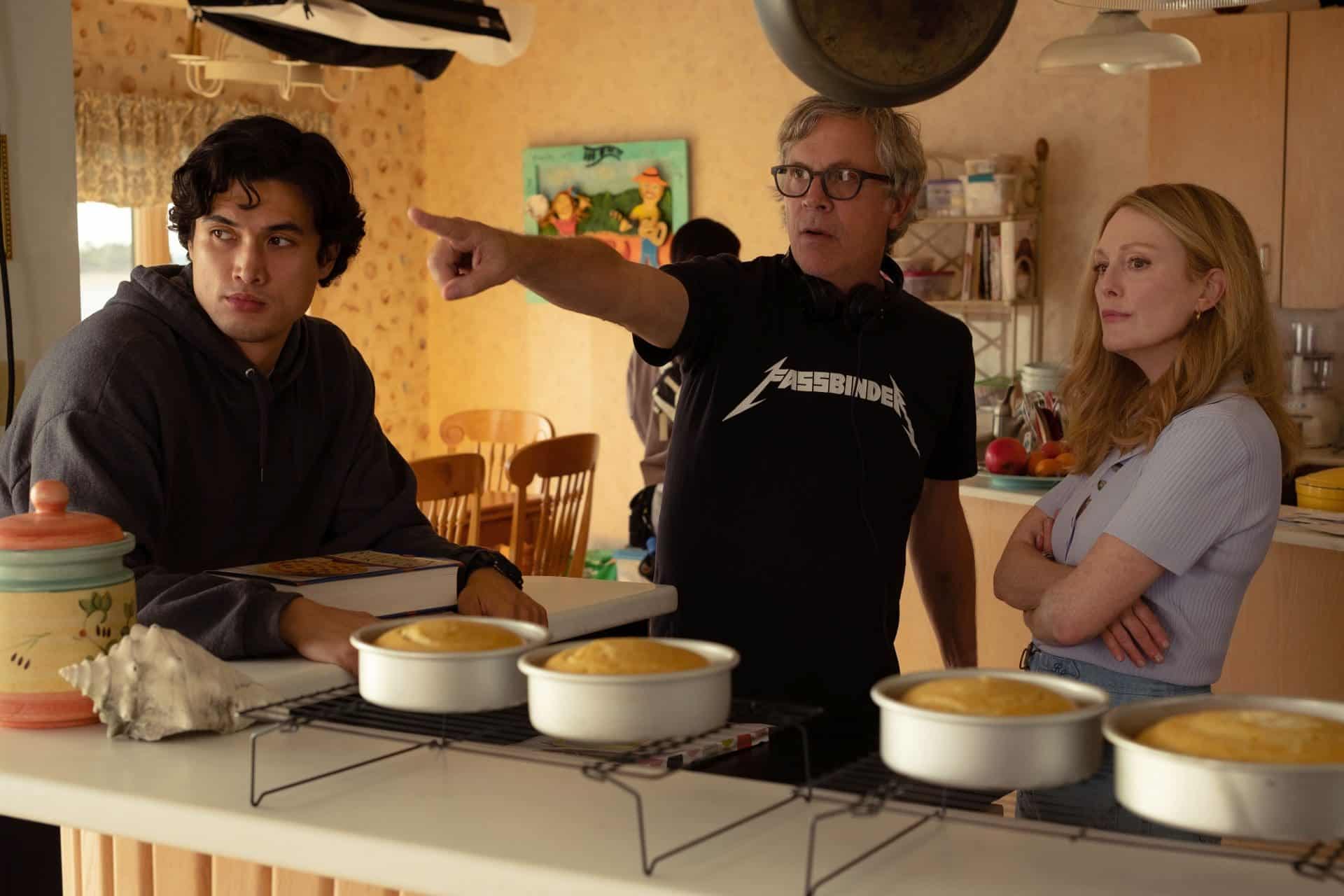
When Todd Haynes describes watching his latest feature May December, he likens it to a game of roleplay. “The film enlists you, as the viewer, to play detective between what’s happening on screen and in your head” says Haynes. And, like the most rewarding games, May December frustrates, it perplexes, and it asks to be actively engaged with.
This approach isn’t new to Haynes, who has spent over four decades crafting an oeuvre of bold, transgressive cinema. Inspired by the 1997 Mary Kate Letorneau scandal, May December is a scathing indictment of moral hypocrisy and media exploitation, though the real beauty of the film is in how it exposes you to the sticky snarls of human nature stopping just short of untangling it for you. “There’s an excitement to wanting to destabilise audiences; their presumptions of what is good and evil, right and wrong,” he says. “I find that to be deliciously antithetical to today’s climate of how many people want representation to answer their already locked-in, hard-wired views of things.”
The film follows actress Elizabeth Berry (Natalie Portman) as she prepares to take on the role of Gracie Atherton in an upcoming indie film which retells her rape of 13-year-old Joe Yoo, their later marriage, and the scandal that erupted around their relationship. In an attempt to get into the heart of the character, Elizabeth visits Gracie (Julianne Moore) and the Yoo family—Joe (Charles Melton) and their three kids— who are now living a seemingly idyllic existence in Savannah, Georgia. But as Elizabeth, Gracie and Joe fall deeper into each other’s orbit, the moral conundrum at the heart of their relationship is soon, too, drawn to the surface. Like Elizabeth, you’ll find it no easy task unlocking May December’s kafkaesque Pandora’s box, but you’ll have a hell of a time trying. “When you crack the case,” Haynes smiles gleefully, “let me know.”
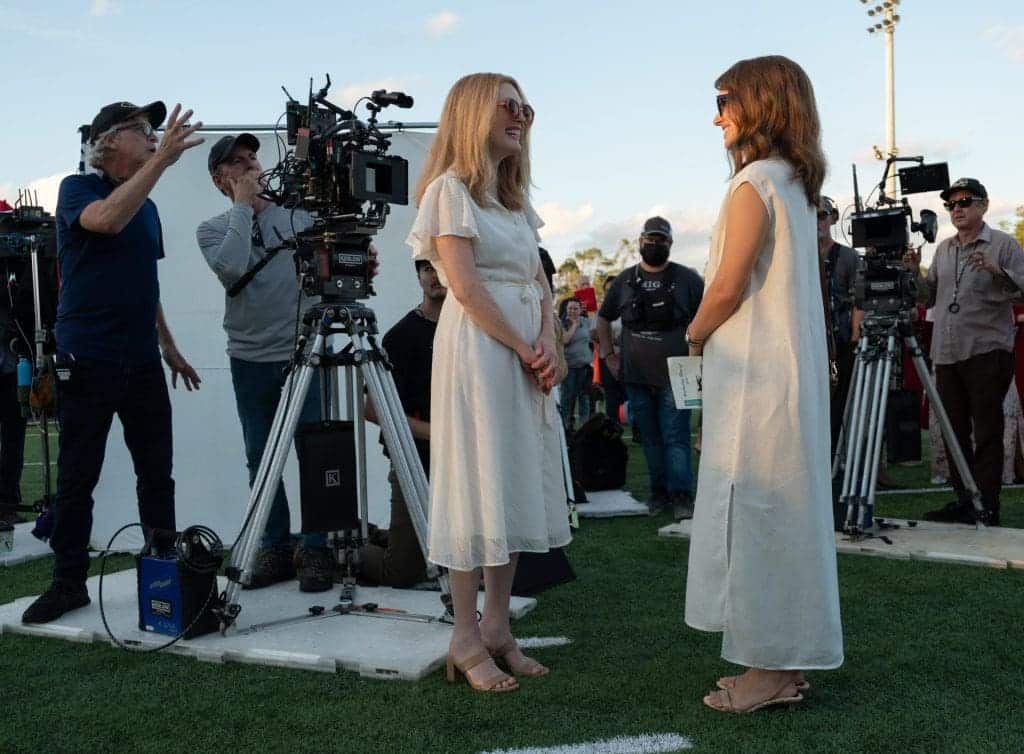
Luke Georgiades: Do you think there’s a beauty in challenging, and sometimes frustrating audiences with a story like May December?
Todd Haynes: All of that was our incentive in trying to turn the script into a film. Those aspects were circulating on the page, and I shared that excitement of wanting to unsettle and destabilise audiences and their expectations, their presumptions of what is good and evil, and right and wrong. It’s what Natalie Portman initially found exciting about the script, and it was that interest in going to those places and provoking those reactions which reminded me of Julianne Moore. So the company started to grow from it. This Wizard of Oz team started to find its key figures very quickly and we were down the road. What’s been so pleasantly surprising in audience reactions to the film thus far is, yes, their uncertainty of not knowing what to make of these tough moral questions that are being posed to them, but also that that very factor has been a pleasurable experience for them—I find that to be deliciously antithetical to today’s climate of how many people want representation to answer their already locked in, preset, hard wired views of things.
LG: Has it become a bigger risk with audiences now to attempt to challenge them?
TH: We’re in a cultural crisis. We’re in a political downturn everywhere in the world. It’s a really scary, bad time. And I think it’s so bad that it’s impossible for us to fully comprehend the scope of it. It means that people grab onto things that get them through those times. And what gets them through is this kind of fundamentalist leaning in thinking, where you hang on very tightly to ideas that are very certain to you. This is absolutely true on the conservative end of things, to a degree that is absolutely astonishing, and then it’s also true on the other side too. There’s a desire to latch on with that same severity.
LG: The film is set in 2015, almost the present day,but not quite. Why did you decide to leave that window between then and now?
TH: I wanted to put it slightly before the American Nazi era began [laughs]. I didn’t want it to be a question that had to be applied to these characters: partisanship, or how attentive they were to what was going on in the country, or if they would have Fox News on. Fox News was playing in the house when we originally scouted it in Georgia. It was always on. It’s a factor. We’ll always have political noise and conflict—the Obama years weren’t easy either, but it was a little less…harsh, maybe.
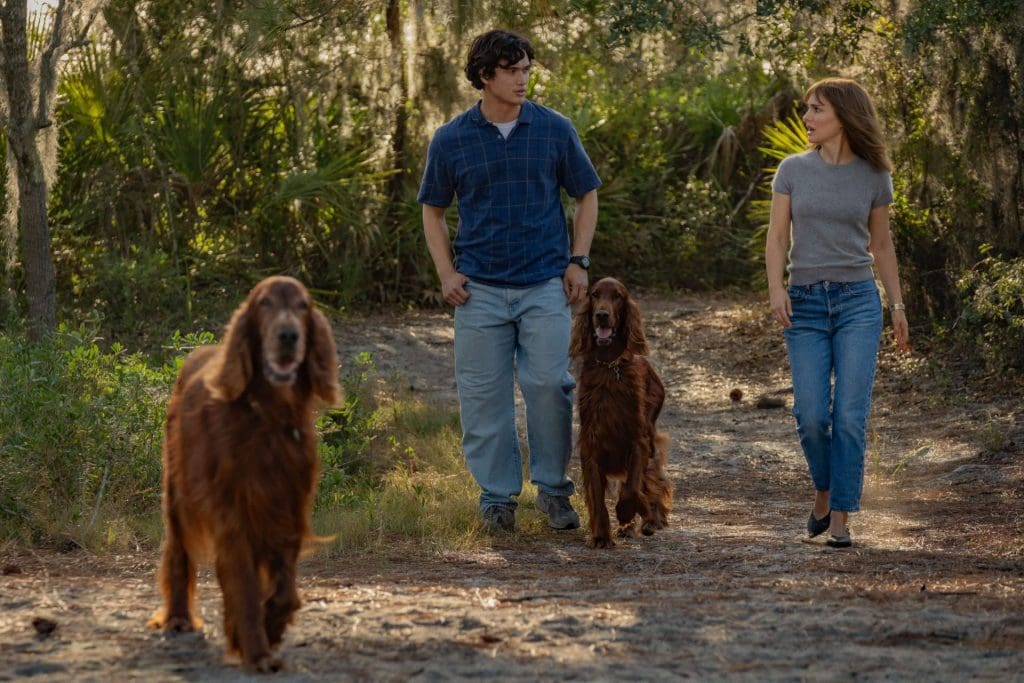
“Sudden death. The end of a relationship. Somebody betrays you with somebody else. We don’t receive those things in a measured way. It’s a jolt.”
Todd Haynes
LG: The Savannah setting is so valuable here. That claustrophobic community feel, and how the Lake House has that serene glow to it that feels like an illusion waiting to be torn down. Were those details already written in the script, or was it something that you came up with later in the process?
TH: The script was originally set in Camden, Maine, which is a very different place than the South. New England has the crisp, cold blue skies and white clapboard buildings; the flag was always waving and the red would blaze through. The colours are primary. But there was no place in the North East that we could shoot in October/ November and have it look like May. I had been to the Savannah Film Festival for my last film and for many of my previous films—it’s a whole other world. It’s a fascinating and strange place.
Even more strange, I would argue, and more intensely laid with American history and the ghosts of the Civil War, than Camden, Maine. And it also happens to come with a very attractive tax rebate incentive for film production. We looked at the map, and I thought: “I don’t see Gracie living in downtown historic Savannah” it’s too dense, and there would be no safe space for her to separate herself. But there was this island community, Tybee, 20 minutes away from downtown Savannah—everything there is 20 minutes from everything else. Tybee was interesting, and while we were there all of our instincts kept being borne out. The way you just described the look of the movie comes completely out of the specificity of the humidity and the marsh backdrops and the white, muggy light of that setting. We used the precipitation lodged between sliding glass doors and in windows as filtration on our lenses so everything looked queasy with humidity, and got turned into that strange, unsettling light.
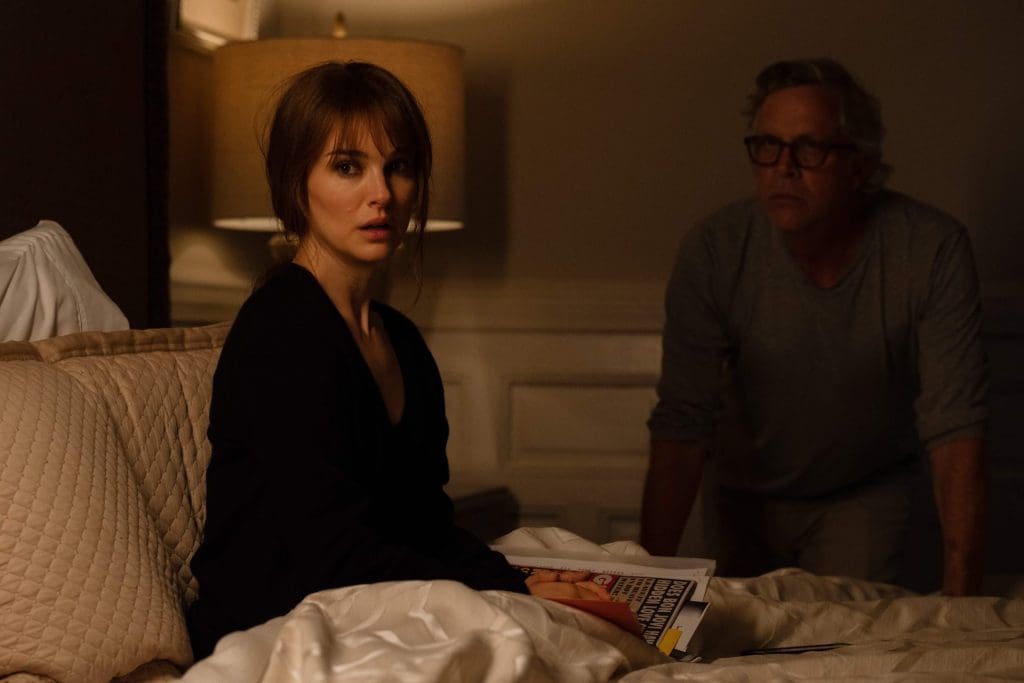
LG: Was it important for you to not judge Julianne’s character?
TH: In the sense of judgement being a closure in the way you think about people, then no, I didn’t want to judge her. We can have judgments about people and the things they’ve done, but also understand them over time and in the context of people’s lives. Even when people commit murder, there’s a process where they, supposedly, face criminal charges, they’re incarcerated, they do their time, they come out.
There’s supposed to be a way that we try and let people move forward and figure out how they’ve made mistakes in the past—even the most heinous. In that context, yes of course, she abused her power as an older person with a younger person. But then she did all the other things that you’re supposed to do in society: she came out of jail, she married him, they raised a family and stayed committed for so many more years than he was ever underage. So all of these questions are held against other questions. That’s what’s so compelling about the story; the way Elizabeth as a character emerges as a troubling person as well, and it forces you to look at Julianne’s character in different ways. You’re looking at everybody in relation to everybody else, and you’re seeing things in them that they do not see in themselves, and yet, are reflected in each other. Each character is a mirror, and as they all examine each other they’re falling infinitely deeper into this well.
LG: In the movie you explore this pursuit of a nonexistent, definitive truth, and it led me to think of our obsession with public figures; we have these parasocial relationships with celebrities that draws such hypocrisy from us. For example, the people who are sending Gracie and Joe boxes of excrement are the same that are going to buy tickets to see the movie that Elizabeth is making about them.
TH: All of it hovers around the, I want to say, periphery—but it’s far deeper and more contaminating than that—of the story, because the characters are so isolated. All three of our central characters are lone wolves. They don’t interact with other people very well or very much. So the people you mentioned aren’t really represented in this film, you just see the effects of what this culture does to the subjects of those obsessions, who have to survive those events, and the way they survive them…the blockades they put up, the resistances they form. Of course, we’re taking easy aim at these notions of truth and representation and all these things that the “actor” brings, and the presumptuous sense that we all know exactly what she’s talking about and there’s nothing to question about it. The script keeps recycling those ideas, but in an incredibly coherent way, so that the very end of the movie is a circulatory of trying to get somewhere that you may never get to. There’s no achievement of the so-called truth in the movie. It’s not demonstrable anywhere in the movie: the things we thought we learned about Gracie in the last second that describe exactly who she is are all of a sudden obliterated in front of you, and you’re like “Uhoh, restart. Not going to solve that riddle!” I love the concept of that.
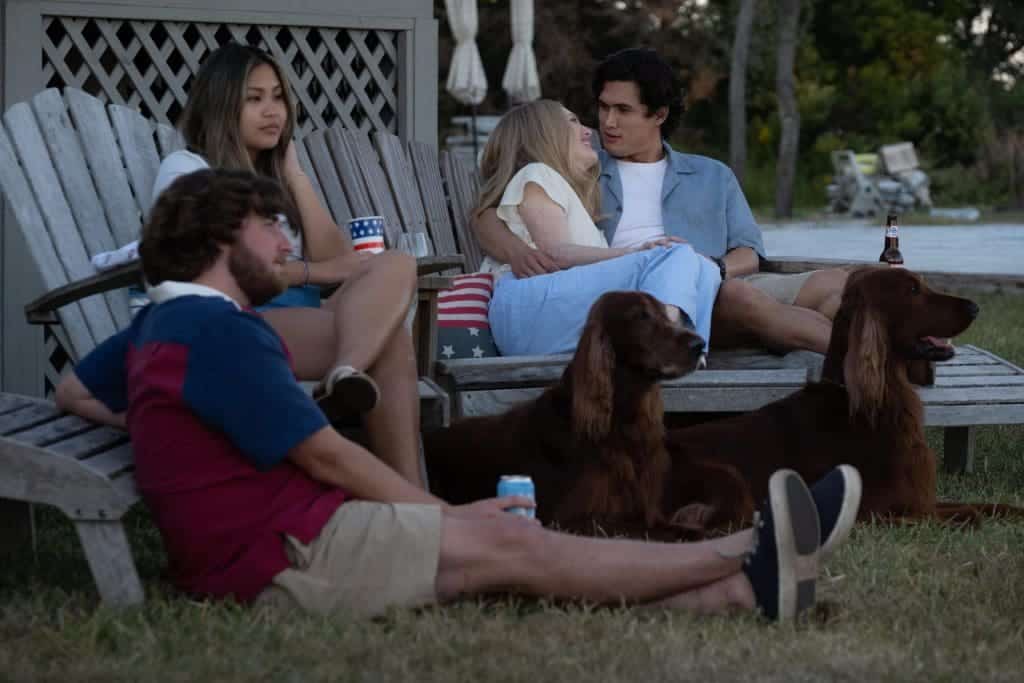
LG: For me, the real observer of these characters is the music. Even as the characters are doing their everyday, mundane activities, the music is lurking in the background like judge, jury and executioner. Can you talk about your intentions with the music in those moments?
TH: I love how you described it so much. I think that’s so great. And, yes, I felt similarly about it. I first heard the score while watching The Go- Between on Turner Classic Movies last year and I was just completely awoken by it, in a way that made me alert to everything in the frame. How was this music going to be satisfied by this seemingly pastoral, picturesque coming-of-age story about a boy visiting his rich friend’s family at the turn of the century and falling in love with Julie Christie? In some ways, it seems to be even more unlikely of a score for the themes of the film than it does in May December. Our movie has a true-crime history in its past, but there’s something locked up in the present that is only starting to show tiny cracks as Elizabeth enters the world of the story. The music is foretelling something darker and ominous than we’re seeing on screen. Something that is coming, or has come, or there’s a body buried somewhere—something not quite right, and there’s an excitement to figure out exactly what that is. The film is enlisting you, as the viewer, to play detective between what’s happening on screen and in your head.
LG: I love that the score is also used for humour. Why was it important for you to have the movie be aware of its own melodrama in that way, and sometimes poke fun at itself despite the reality of the story being naturally quite dark?
TH: In only the best melodramas will you find a sense of compression and overdetermination and excess in their mode, tones, music, and events that occur. Yet, something about even the artificial extremity of melodrama produces something that reminds you of how crazy it feels to be alive, and to confront things in your own life that are unexpected jolts to what you thought your life was about. Sudden death. The end of a relationship. Somebody betrays you with somebody else. We don’t receive those things in a measured way. It’s a jolt.
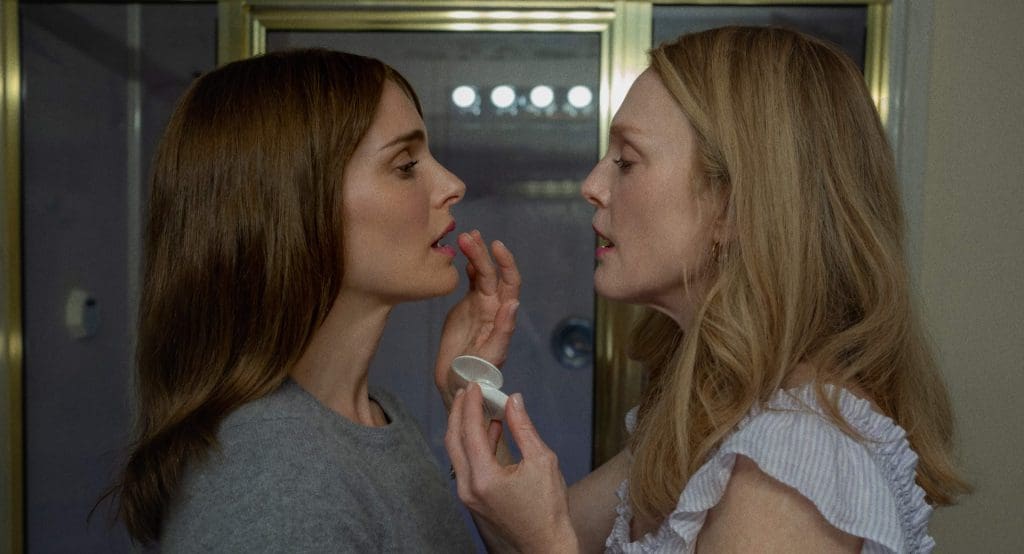
LG: I’ve always been obsessed with the museships between directors and actors—it’s one of the beautiful phenomena of cinema to me—and you and Julianne have been with each other since your second film. What has she taught you about filmmaking and what qualities do you see in her that only she has been able to deliver for you in certain roles?
TH: I’m always learning from Julianne. She has this sensory understanding of what the lens of the camera sees and what the audience will see on screen, that sometimes you can’t even see in the room while you’re shooting it. It’s this intense and incredibly complex being of transparency and opaqueness at the same time; the combination of the two, where there’s something you cannot entirely read on her face. I would call it a decision, and it is, because she’s so intentional, but there’s also something so organic about it as well, that it stirs up something in the viewer that is this more active, inquisitive thing of wanting to interpret and wanting to penetrate and fill in the gaps. She knows how to leave those spaces for you, in order to question or debate or be unsettled by. That gives this complex life to the mind of the viewer. Somehow we found in each other a counterpart to the same belief: that everything is about the viewer in the movie, and everything that is alive in the movie is happening in their heads; it’s not something that you’re hand delivering to them all completed…you’re giving them something to do. There’s a scene where she cuts a piece of coconut cake for Joe, and I could watch that shot of her reacting to it for the rest of my life, and keep making new discoveries inside of it. The language leaves me.
You can read our review of May December here.





